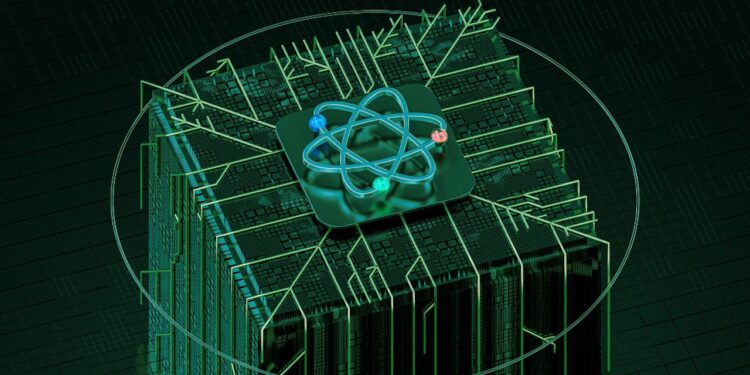- Quantum computing would provide unparalleled computational power, revolutionizing industries such as financial services, healthcare, supply chain logistics, cybersecurity, and AI/machine learning.
- The shift to quantum computing will necessitate significant workforce reskilling and may lead to job displacement in routine data processing and complex algorithmic tasks, driving demand for specialized quantum-related skills.
- The adoption of quantum computing could be challenging, requiring high infrastructure costs, technical complexities, and the need for new educational and training programs to address a potential digital divide.
Quantum computing is a revolutionary technology that offers speeds up to 158 million times faster than current supercomputers — potentially performing tasks in minutes that would take traditional supercomputers 10,000 years.
Although it’s still in developmental stages, quantum computing promises unprecedented computational power that could revolutionize many aspects of work, and how humans perform work. Will the workforce be able to keep up?
The full impacts of quantum computing’s advent would be profound: from industry transformations and specific job changes to ethical concerns, there would be immense transitioning hurdles, including extreme skills demand. But before we can speculate on this technology’s effects, we need to understand it.
What is quantum computing?
Quantum computing is a fundamentally different method of computation that leverages the principles of quantum mechanics. Unlike classical computers that use bits (0s and 1s), quantum computers use quantum bits, or qubits.
To put it in simple terms, quantum computing uses qubits, which can be both 0 and 1 at the same time. Qubits can also be linked together, so the state of one affects the other, no matter how far apart they are.
How does a quantum computer work?
Quantum computers leverage quantum mechanics principles to perform powerful calculations. Superposition lets qubits process multiple paths at once, this entanglement creates intricate correlations between qubits to boost computational power, and quantum interference helps enhance accuracy by amplifying correct results and canceling out errors.
What are some practical applications of quantum computing?
Quantum computing has the potential to revolutionize many areas because it processes information in ways that classical computers can’t. One exciting use is in solving optimization problems, as quantum computers can handle complex situations better, which can improve things like logistics, supply chain management, and workforce scheduling.
In cryptography, quantum computers can easily break traditional encryption methods, so development of new quantum-safe encryption would be necessary to protect our digital communications and data.
For machine learning, quantum computers can tremendously speed up algorithms, helping with data analysis and personalized decision-making in various industries. In drug discovery, quantum computing can quickly run simulations in chemistry and materials science, speeding up the development of new drugs and benefiting the healthcare sector.
The financial industry could also gain a lot from quantum computing by its ability to enhance risk analysis, portfolio optimization, fraud detection, and economic forecasting.
In material science, quantum computing allows for faster and more accurate simulations of microscopic processes, leading to the discovery and development of new materials. These advancements can drive innovation across technology and manufacturing industries.
When will quantum computers be widely available?
While significant progress has been made, it is unlikely that quantum computers will be widely available for commercial use in the next decade. However, specialized applications in high-stakes environments like national laboratories or major financial institutions may see earlier adoption.
What will the impact of quantum computing be on workplaces?
This new technology will undoubtedly lead to countless breakthroughs, which will help spur innovation and efficiency at unprecedented rates. However, these advancements could also introduce significant disruptions, as certain job functions — particularly those involving routine data processing or complex algorithmic tasks — may be rendered obsolete or heavily augmented by this new class of computational power.
We’ll need a flexible and skilled workforce with quantum knowledge that would prioritize teamwork across various fields to fully utilize quantum technologies, while also tackling socioeconomic gaps and ethical issues they bring.
Potential Industries and Roles Most Likely to Be Affected
- Financial Services
Quantum computing could revolutionize risk modeling, portfolio optimization, fraud detection, and more. Investment banks, hedge funds, and insurance companies are particularly likely to adopt quantum computing to uncover patterns in massive datasets that are impossible for classical computers to process efficiently.
- Pharmaceuticals and Healthcare
Quantum computers could significantly accelerate drug discovery and personalized medicine. They could simulate complex molecular structures and interactions at an unprecedented scale, potentially cutting down the time required for new drug development from years to months.
- Supply Chain and Logistics
Quantum computing has the potential to optimize highly complex logistics and supply chain operations. Companies could solve intricate routing problems and forecast demand more accurately to reduce costs and improve efficiency.
- Cybersecurity
The same power that makes quantum computing transformative also presents new threats. Quantum computers could break current encryption methods, necessitating new quantum-resistant algorithms. Cybersecurity professionals will need to develop and implement these new protocols.
- AI and Machine Learning
Quantum computing can enhance the capabilities of artificial intelligence (AI) and machine learning algorithms, enabling more accurate predictions and data analysis, thereby transforming industries like marketing, customer service, and more.
How will quantum computing help workers?
Quantum computing will aid workers by handling tasks involving massive datasets and complex computations more efficiently. This will free up human resources to focus on more strategic, creative, and emotionally intelligent activities.
Employees skilled in quantum computing will find themselves in high demand, potentially leading to lucrative career opportunities.
Moreover, quantum computing can revolutionize industries by optimizing supply chains, financial portfolios, and logistics — thereby improving overall operational efficiency. As a result, organizations could achieve cost savings and better resource allocation, indirectly benefiting workers through improved working conditions and potential financial incentives.
What are some challenges in quantum computing?
Quantum computing poses challenges such as the potential disruption of current job markets due to the automation and optimization capabilities it offers. Additionally, the workforce will need to evolve, requiring upskilling and reskilling to manage and harness this new technology — potentially leading to a digital divide where some workers may be left behind due to a lack of access to necessary education and resources.
There will also be some transition challenges from classical to quantum systems, such as:
- Workforce Reskilling
A shift to quantum computing will necessitate reskilling the workforce. Professionals will need to familiarize themselves with quantum computing concepts and develop new competencies. Educational institutions and corporate training programs will play a crucial role in this transition.
It would also necessitate hardware and software modifications that could require updating even basic computer skills training.
- Long-Term Impact on Professional Skills Demand
The advent of quantum computing will likely result in a higher demand for specialized skills in quantum programming, quantum cryptography, and quantum hardware engineering. Additionally, related fields like quantum chemistry and quantum information science will see increased relevance, influencing academic curricula and professional development programs.
- Technical Complexities
Transitioning from classical to quantum systems involves significant technical challenges, including developing robust quantum algorithms and error-correction methods. Engineers and computer scientists will need new skills to design, test, and maintain quantum systems.
- Infrastructure Costs
Quantum computers require specialized infrastructure, including extremely low temperatures and shielding from electromagnetic interference. These requirements entail significant capital investment and operational costs, which could initially limit adoption to only the most well-funded organizations.
While the transition from classical to quantum systems will be fraught with obstacles, the long-term impact on professional skills and job roles will be profound, ushering in a future of work characterized by unprecedented innovation and efficiency.



 Dr. Gleb Tsipursky – The Office Whisperer
Dr. Gleb Tsipursky – The Office Whisperer Nirit Cohen – WorkFutures
Nirit Cohen – WorkFutures Angela Howard – Culture Expert
Angela Howard – Culture Expert Drew Jones – Design & Innovation
Drew Jones – Design & Innovation Jonathan Price – CRE & Flex Expert
Jonathan Price – CRE & Flex Expert














